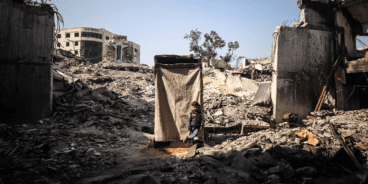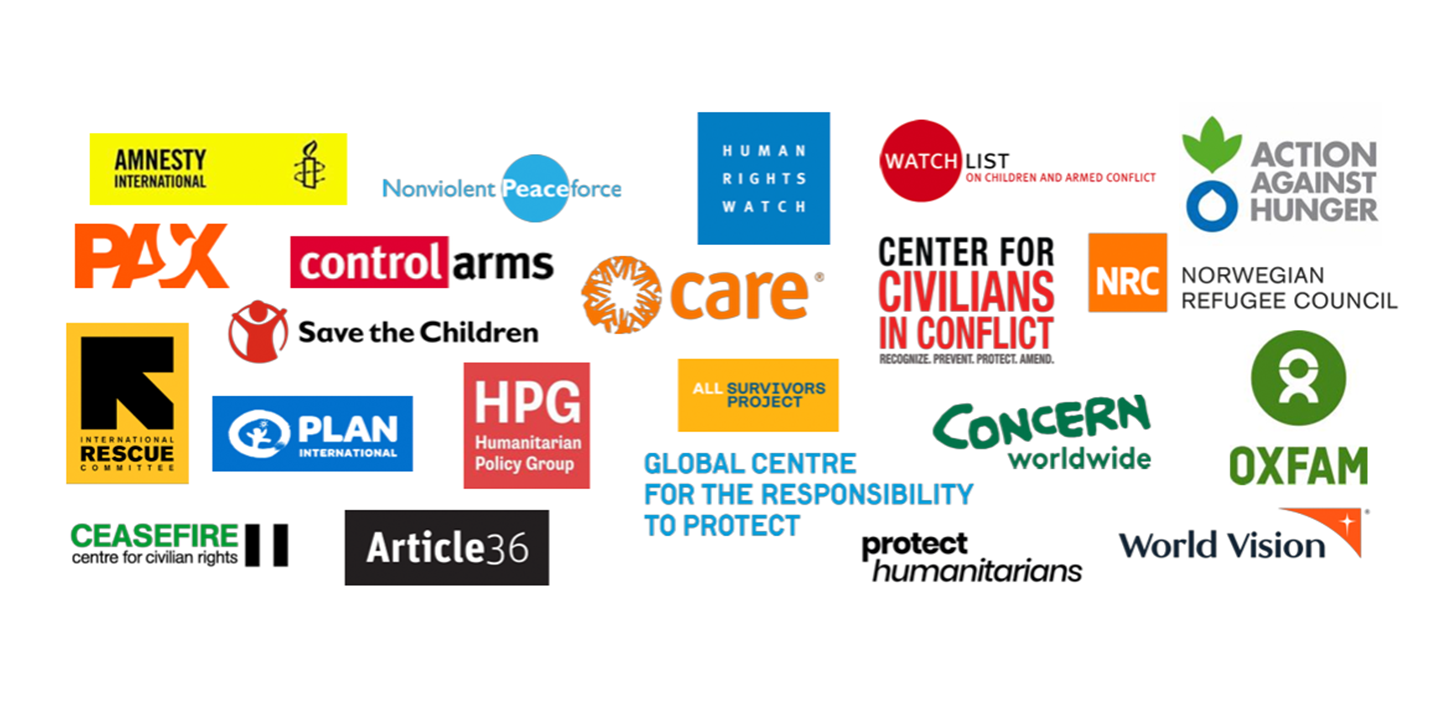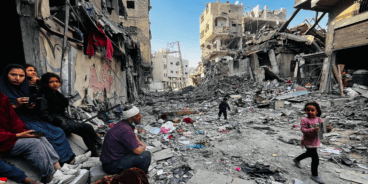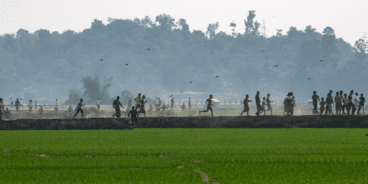

2025 NGO Statement Ahead of the Open Debate on Protection of Civilians
One year after the UN Secretary-General outlined the “resoundingly grim” state of civilian protection, the situation continues to deteriorate. 21 NGOs call for urgent action by the UN Security Council and UN Member States to strengthen accountability and ensure robust implementation of protection mandates.
Civilians living in conflict zones today are in more danger than ever before. The UN recorded a 72% increase in civilian deaths in armed conflict between 2022 and 2023, with the proportion of women and children killed doubling and tripling respectively. Over 473 million children – more than 1 in 6 globally – now live in areas affected by conflict. In 2023, UN-verified cases of conflict-related sexual violence, the majority of which against women and girls, increased by 50 per cent compared with 2022. Intersecting and multidimensional vulnerabilities are also compounded for marginalized groups. Those who survive are often injured, displaced, and frequently cut off from their communities and support networks. As a result they can become reliant on humanitarian aid for services such as healthcare, water, electricity, and education for years or even decades.
The use of explosive weapons in populated areas continues to have a devastating effect on civilians, causing both immediate harm and long-lasting cumulative and reverberating impacts. These attacks are often fuelled by third party arms transfers. The resultant patterns of harm not only deepen humanitarian need, but also undermine the foundations for sustainable peace. When civilian infrastructure and their natural environment is destroyed and social cohesion fractured, the road to recovery is steeper and longer, impeding justice and increasing the risk of renewed violence.
Parties to conflict are, in many cases, intentionally undermining the international norms and standards designed to protect civilians from the conduct of war and are deliberately violating International Humanitarian Law (IHL), eroding even the bare minimum of protections owed to civilians. Of particular concern is the speed with which States are backsliding on their commitments to protect – and ensure the protection of – civilians. Consequently, the deliberate targeting of civilians is becoming a tool of warfare, further fueling a culture of impunity.
The humanitarian consequences are staggering. 305.1 million people are in humanitarian need, a number that has quadrupled in the past decade, primarily driven by conflict. 123 million people are forcibly displaced worldwide, double the figure from 2015, and 281.6 million people are experiencing crisis or worse of food insecurity (IPC 3+). While these statistics are unfathomably high, each number represents an individual – a farmer who has lost access to their livelihood and is struggling to feed their family, an elderly person displaced multiple times and living in a camp, a child not able to go to school.
Across the world, humanitarian actors and civil society are working relentlessly to respond to the escalating needs of conflict-affected populations, while facing growing risk of harm and operational constraints. Local actors, including women-led organizations, face the greatest risk. Across the board, resources are being slashed or politicized, further intensifying the level of risk borne by local actors. Amid this dire reality, civilians themselves are seeking to hold their communities together under immense strain and standing firm in their calls for peace and justice. They need the international community to not just bear witness, but to act.
The 2025 UNSC Open Debate must confront this truth: there is no shortage of tools to protect civilians, but there is a shortage of political will to use them equally and follow through with practical implementation and accountability. From legal instruments and policies, early warning mechanisms, civilian harm tracking, and civilian-military dialogues to sanctions, independent investigations, and accountability and remedy mechanisms – these tools are too often sidelined and ignored rather than being leveraged, supported, prioritized, and fully integrated.
Diplomacy is failing. At the United Nations Security Council the most powerful countries in the world are making ineffective the body charged with ensuring international peace and security. In the past 10 years, the permanent members used their powers to veto resolutions at least 36 times. 2024 saw the fewest UNSC resolutions adopted since 1991 and the highest number of draft resolutions failed due to veto since 1986.
The UN turns 80 this year. Instead of retreat there must be renewed urgency in support of – and commitment to – multilateralism, the UN Charter, and the international rules based order, with the protection of civilians at its core. Impunity feeds on itself.
In the absence of real accountability for harm caused and the just and equitable application of international law and standards at all times and in all places, this dangerous cycle characterized by compounding harms and prolonged suffering will continue.
Below are a set of recommendations for action:
UN Security Council:
-
-
- Suspend use of the veto: All P5 members should support the proposal to suspend their use of the veto in the UN Security Council in cases of mass atrocities.
- Enhance monitoring and verification mechanisms: Provide support to sanctions committees, the Secretariat, and investigative teams to improve verification methods, techniques, and procedures and develop standardized processes to ensure consistent enforcement of Panel of Experts’ findings. Establish robust systems to objectively verify compliance with arms embargoes and improve transparency in panel findings. Support and adequately resource the UN Monitoring and Reporting Mechanisms on the six grave violations against children in armed conflict, and on conflict-related sexual violence.
- Monitor the implementation of UNSC 2730 (2024) on the protection of humanitarian personnel: A mechanism should be created to follow up on the investigation and prosecution by Member States of crimes against humanitarian, UN and associated personnel and to ensure victims and survivors are meaningfully included in discussions on their protection.
- Strengthen implementation of POC-related resolutions: A working group of current and former Council members should develop a set of proposals, in consultation with civil society and the UN, on strengthening implementation of UNSC Resolutions related to POC that should be discussed by the Council.
- Support the prioritization of protection mandates along with the key mandate activities that support civilian protection, like human rights, child protection and WPS monitoring and reporting, and community engagement, as appropriate. Protection should be a non-negotiable and prioritised component of peacekeeping missions. The Council should also require missions to support, capacitate, and fund other protection actors, particularly host government institutions and locally-led CSOs, including women-led organizations, in building capacity to protect civilians before, during, and after mission exit.
-
Member States:
-
-
- Enhance investigation and prosecution in national courts – including through the use of Universal Jurisdiction – of the perpetrators of all violations of IHL.
- Develop and strengthen national POC strategies. Governments should work with key national stakeholders to enhance the full protection of civilians, including by developing whole-of-government protection strategies aimed at reinforcing and coordinating national actions to protect civilians and civilian infrastructure including healthcare – both within national borders and those in countries to which security forces might deploy.
- Ensure proper transparency, oversight and accountability for arms transfers; ensure arms transfers do not occur when there is an overriding risk they might contribute to IHL or IHRL violations.
- Review, strengthen, and ensure transparency and effective oversight of national laws, practices, and military action and training systems including in engagement with security or military partners and recipients of security assistance. Official security partnerships should be leveraged to improve the understanding of and adherence to IHL by local security forces (state and non-state) to minimise civilian harm.
- Support for local protection capacities and initiatives: Donors and states should provide sustained, flexible financial and technical support to civil society and civilian-led protection efforts, including monitoring and documentation of violations, early warning mechanisms, inclusive dialogue processes, and community-based response models. Local knowledge, perspectives, and expertise should be meaningfully integrated into protection planning and post-harm responses. This should include broad representation from civil society, including women-led organizations.
- Ensure the need to prevent and mitigate civilian harm is prioritised as new tools emerge, such as those related to the use of Artificial Intelligence.
-
Related Content


Atrocity Alert No. 415: Israel and the Occupied Palestinian Territory, Sudan and North Korea
